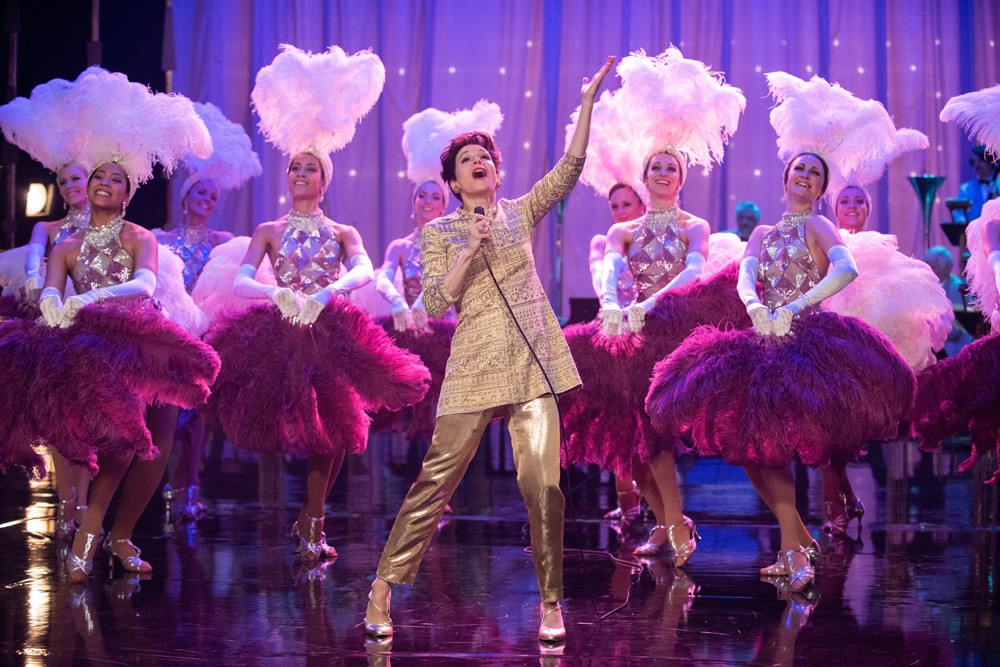Treating The Wizard of Oz as the lone noteworthy work in a lifelong screen career, Judy [as in Judy Garland] follows a screen idol on the run, escaping to London in her twilight days to attempt a sort of comeback revue. Its director, Rupert Goold, does so with a manner something like a PI, hoping that what he observes in this fictive 1969 will cohere as evidence, amounting to a story — or enough of one.
As an entertainment biopic, Judy's part of a genre that needs no character or psychology, only performance — here provided with thoroughgoing commitment by Renée Zellweger, who finely channels Garland's nervy gestures and wry demeanor. Regarding Garland in her late 40s as a prematurely fading relic rather than a living person, Goold never manages to inhabit her emotionally. Leaning on pity (which is not a function of empathy), he takes Garland's past glories as a given without ever really showing that he understands either her craft or inner life at any point in time. Taking for granted our investment in something "classic," he draws as little from flashbacks as he does the strange contours of her late-career performance, a draglike vision of herself he struggles to see much glory in. Instead of doing so, he crosses his fingers that the downward spiral-last hurrah structure that typifies these things will amount to resonance (or to awards), and ring out to the viewer.
But in this case the structure's confusing, and ill-fitting: we're observing a spiral down from what heights, exactly? Interspersed as it is with backstage travails from her early days, Judy comes closest to proffering a worldview when it presents Garland's biography as continuous, a suggestion which might have been accidental. From its past-tense arguments (prompted most often by long workdays and subbing pills for sleep and meals) to its present (in which an anxious, impoverished Garland medicates to get over her depression and anxiety to perform), the movie intermittently posits her slide as a continuous trajectory rather than the more familiar rise, peak, and fall. Schooled from childhood in self-denial for the sake of becoming a legible (and maybe heightened) version of herself, the progression of Garland's life can be read as a long walk down a hall of mirrors, an existence that drowns out presence — in both tense and body — with phantoms of herself.
But is there understanding in the script itself? I think not. What's above, whatever it's worth, is more me grasping at what must have been a dissociating lived existence, a push beyond what's ever offered here onscreen. In Judy, bringing the goods is the viewer's job, lacking as it is not only in psychology and drama but texture and style to boot. Given its subject of a life lived in entertainment, all are needed to produce any kind of credible arc or movement. Failing to make much of either her then-present talent (showcased in recitative vocal performances and weakly choreographed numbers) or to suggest any insight into her past work, Goold assumes he has you at the word "Oz" and expects that to carry us through.
Opening as he does with a reveal in flashback of the set — complete, naturally, with a digitally enhanced yellow brick road — one can practically hear Goold whispering "movie magic" without any grasp personally on what makes a cinematic style or how exactly old studio movies worked. Shooting with a mobile camera and habitually placing characters dead-center in compositions (like on a stage, get it?), it seems Goold never met a scene he couldn't push a camera toward in the name of tension, never saw a filter he wouldn't apply for style. The result is the achievement of neither, a set of telegraphed gestures that never feel creative — yet are undertaken quite seriously, whether as substitutes for personality or as gestures toward homage.
While it's understandable to castigate Garland's early handlers for wringing all they can from her, Judy neglects the fact that though her working conditions were, as was horrifyingly common, abusive, she achieved a screen presence from the collaboration that feels singular for its blend of nervous energy and glossy, brimming affect just as surely as she suffered deeply. I'll neither defend her executives' and managers' methods nor will I give them credit for the work that's rightly hers. But I can say that whatever happened while they cruelly mined her life and talent, it proved by some miracle a rich collaboration, elevated by some combination of personal insight, creative vision, and calculated purpose. Prospecting her life and work in much the same vein, Goold and company just can't provide.
Get our top picks for the best events in Detroit every Thursday morning. Sign up for our events newsletter.


